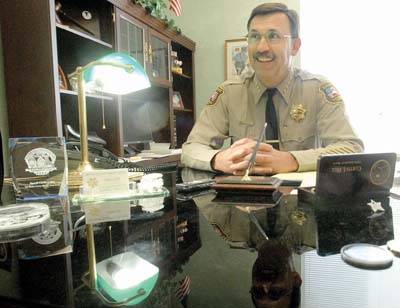
Sheriff Curtis Hill took time this week to reflect on a career
that will span nearly 35 years once his third and final term as
sheriff ends about a year from now. He spoke about progress the
office has made over the years and also talked about challenges he
has faced in balancing his home and professional life, his
expectations to stay away from public office after retirement, and
the saga that became of the Michael Rodrigues rape trial.
When Sheriff Curtis Hill joined the local department as a 22-year-old deputy in 1976, the office culture was much different.
“When I started, nobody wanted to hear anything you had to say until you’d been here for five years,” Hill said.
That, he said, has changed.
Hill took time Tuesday to reflect on a career that will span nearly 35 years once his third and final term as sheriff ends about a year from now. He announced this week that he will not run for reelection and instead will retire from law enforcement following more than three decades in the local office and a dozen years as the county’s elected sheriff.
The main change he has witnessed through the years, he said, has been what he touted as a significant increase in the quality of staff members in the office and a culture transformation allowing more open dialogue in the office. Hill also spoke about challenges he has faced in balancing his home and professional life, his expectations to stay away from public office after retirement, and the saga that became of the Michael Rodrigues rape trial.
Hill and Rodrigues, who was a sergeant when fired in September 2007, spent 25 years in the office working together. The sheriff had declined to comment about Rodrigues during the investigation and trial, which ended in September with convictions on four counts and the ex-deputy getting a 60 years to life prison sentence.
Hill this week said he could not comment on details because there remains potential liability for the county.
“The bottom line is,” Hill did say, “people make personal decisions with their behavior. He made decisions. Unfortunately, they were the wrong decisions. Now he’s going to live with that.”
As for any difficulties the office may have faced during the process, Hill said the organization already had “moved well past that” by the time the trial came around.
“I’ve got a group of employees who never knew who he was,” he said. “They don’t even know who he is and they don’t care.
“Just speaking globally, when those things happen, those kinds of things are an embarrassment to law enforcement. Hopefully, he’ll be able to sit back and think about that. Because he is solely responsible for his behavior. No one else is responsible other than him.”
For the full story on the in-depth interview with Hill, see the Pinnacle on Friday.








